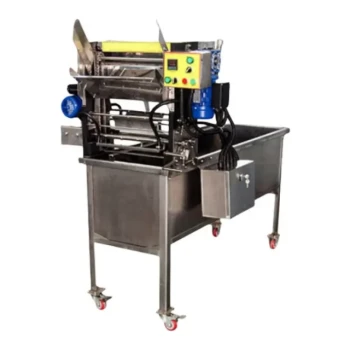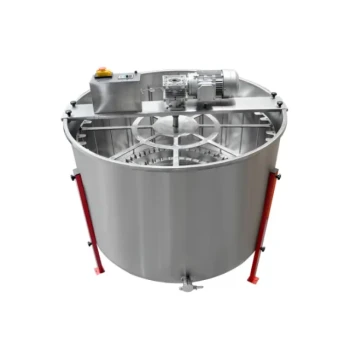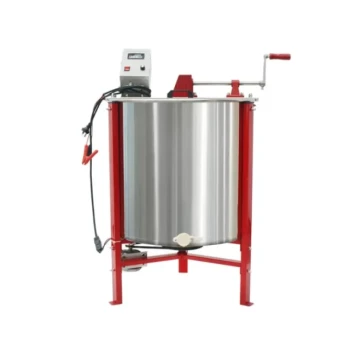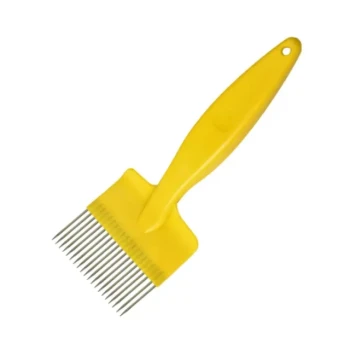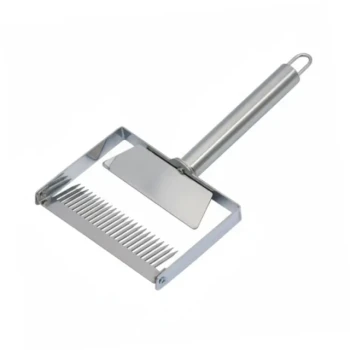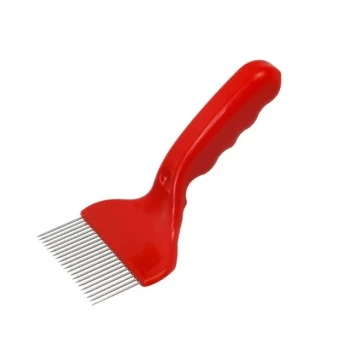To properly use a honey extractor, you must first prepare your frames by removing any lingering bees and carefully uncapping the wax cells with a hot knife. Load the frames into the extractor, ensuring the weight is balanced to prevent damage. Spin the frames to extract honey from the first side, then reverse them and spin again to empty the second side, using centrifugal force to draw the honey out while preserving the delicate comb.
The goal of honey extraction is not simply to remove honey, but to do so efficiently while keeping the beeswax comb intact. This saves the bees immense time and energy, as they can immediately begin refilling the preserved comb rather than rebuilding it from scratch.
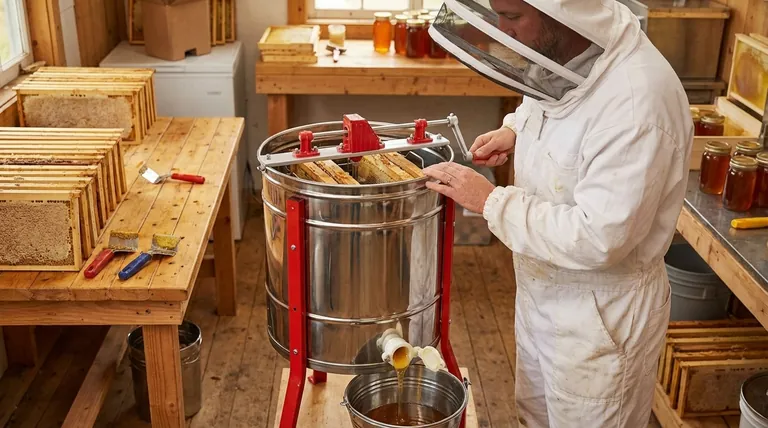
Step 1: Preparing Frames for Extraction
Before you can use the extractor, the honey frames must be properly prepared. This stage is crucial for a clean and successful harvest.
Clear Bees from the Frames
Your first task is to ensure the frames are free of bees. A bee brush is a gentle tool designed to sweep any remaining bees off the comb and back into the hive without harming them.
Uncap the Honey Cells
Honey is stored in hexagonal wax cells, which are then sealed with a wax capping for preservation. The extractor cannot pull honey through this capping.
You must remove these cappings using a heated uncapping knife or a specialized fork. This process slices off the top layer of wax, exposing the liquid honey within the cells.
Step 2: Operating the Extractor Correctly
With your frames prepped, you are ready to begin the extraction process. Proper technique here prevents damage to both your equipment and your valuable honeycomb.
Balance the Load
The single most important rule is to balance the extractor. Place frames of similar weight directly opposite each other inside the basket.
An unbalanced load will cause violent shaking during operation, which can damage the extractor's bearings, break your frames, or even cause the entire machine to tip over.
Use a Two-Stage Spin
Do not spin the frames at full speed immediately. This creates a high risk of "blowouts," where the weight of the honey on the un-extracted inner side breaks through the center of the comb.
Instead, start by spinning at a moderate speed to extract about half the honey from the first side. Then, stop the extractor, flip the frames to face the other way, and spin again. This second spin can be faster, as it will fully clear both sides of the comb.
Respect Frame Integrity
Honey extractors rely on centrifugal force. This force can be destructive to weak or poorly constructed frames.
Only use frames that have a solid foundation, preferably with wire or plastic supports. Foundationless frames are very likely to break apart during the spinning process, creating a difficult mess to clean.
Understanding the Trade-offs
Not all extractors are the same. The type you use will influence the efficiency and labor involved in your harvest. Understanding the differences is key to matching the equipment to your goals.
Tangential vs. Radial Extractors
A tangential extractor holds the frames with one side facing outward. This is why you must flip the frames halfway through. They are generally less expensive and suitable for smaller operations with a few hives.
A radial extractor holds frames with the top bar facing outward, like spokes on a wheel. Centrifugal force extracts honey from both sides simultaneously, making them far more efficient for larger-scale beekeepers.
Manual vs. Motorized Extractors
Manual extractors are powered by a hand crank. They are simpler, cheaper, and do not require electricity, but they demand significant physical effort.
Motorized extractors use an electric motor, providing consistent speed and freeing you up for other tasks, like uncapping the next batch of frames. They are the clear choice for anyone managing more than a handful of colonies.
Making the Right Choice for Your Harvest
After the honey is extracted, it will pool at the bottom of the extractor. Use a clean, food-grade bucket to collect it from the spigot or honey gate.
- If your primary focus is a small-scale hobby: A manual, tangential extractor is a cost-effective choice that gets the job done for a few hives.
- If your primary focus is efficiency and growth: A motorized, radial extractor is a necessary investment that will save you significant time and labor as your apiary expands.
- If your primary focus is preserving the comb: Follow the two-stage spin process and always balance your load, regardless of the extractor type you use.
Mastering the honey extractor transforms your harvest from a laborious chore into an efficient process that respects the hard work of your bees.
Summary Table:
| Key Step | Essential Tip | Why It Matters |
|---|---|---|
| Preparation | Clear bees with a brush; uncap cells with a hot knife. | Ensures a clean harvest and allows honey to flow freely. |
| Loading | Always balance frames of similar weight opposite each other. | Prevents damage to the extractor and broken frames. |
| Spinning | Use a two-stage spin: moderate speed, then flip and spin again. | Protects the delicate wax comb from blowouts and breakage. |
| Equipment Choice | Radial extractors are more efficient; motorized saves labor. | Matches your operation's scale for maximum productivity. |
Ready to upgrade your harvest efficiency?
Whether you're a commercial apiary scaling up or a distributor stocking quality equipment, the right extractor makes all the difference. HONESTBEE supplies durable, high-performance honey extractors and a full range of beekeeping supplies designed for professional results.
Let's discuss the best equipment for your needs. Contact our wholesale experts today to get a quote and learn how we can support your beekeeping success.
Visual Guide

Related Products
- 2 Frame Stainless Steel Manual Honey Spinner Extractor for Beekeeping
- HONESTBEE 72 Frame Industrial Electric Honey Extractor for Beekeeping
- HONESTBEE 3-Frame Manual Acrylic Honey Extractor
- Commercial Electric 12 Frame Honey Extractor Spinner Motorized Honey Extractor
- 6 Frame Manual Stainless Steel Honey Extractor Beekeeping Equipment
People Also Ask
- What are some expert tips for cleaning a honey extractor? Protect Your Harvest & Equipment
- How do beekeepers harvest honey from the honey super? A Step-by-Step Guide to Efficient Extraction
- How do you extract honey by hand? A Guide to Crush & Strain vs. Manual Extractor
- What is honey extraction? A Complete Guide to Harvesting Honey Efficiently
- What are some safety tips for using electric honey extractors? Ensure a Smooth, Hazard-Free Harvest








